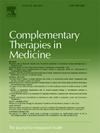综合植物提取物对长期 COVID 的影响:一项探索性随机对照试验。
IF 3.3
3区 医学
Q1 INTEGRATIVE & COMPLEMENTARY MEDICINE
引用次数: 0
摘要
背景:自 COVID-19 大流行以来,长效 COVID 已成为全球健康负担。本研究旨在评估含有枳实、三棱草、大麻、高山植物和胡椒的植物提取物(CPE)组合配方对长期慢性阻塞性肺病患者的疗效和安全性。新开发的长COVID症状问卷用于评估结果:这项随机、双盲、安慰剂对照试验在泰国兰实大学药学院进行。参与者被随机分配接受 CPE 补充剂(4,500 毫克/天)或安慰剂,为期 7 天。主要结果是 C 反应蛋白 (CRP) 水平和症状总分(从 0 分到 57 分不等)的变化。次要结果包括COVID长期症状的完全恢复/改善、与健康相关的生活质量(HRQOL)和不良事件:结果:共有 66 人参加了研究,每组 33 人。与安慰剂相比,CPE补充剂并未明显降低CRP水平,中位数差异(MD)(95% CI)为-0.05 (-0.49, 0.39) mg/L。不过,CPE 组的症状总分有所降低[MD(95% CI)为 -4.00 (-7.58, -0.42)],中重度症状[RR(95% CI)为 0.57 (0.35, 0.91)]、中重度疲劳[RR(95% CI)为 0.25 (0.08, 0.81)]和中重度劳累后乏力 (PEM) [RR (95% CI) 为 0.35 (0.16, 0.78)]的总体症状有所降低。各组间的 HRQOL 评分变化无显著差异。不良反应大多较轻,并在随访期结束时得到缓解:我们的研究表明,CPE 在缓解中度至重度长期 COVID 症状(尤其是疲劳和 PEM)方面具有潜在的益处,且安全性可接受。然而,有必要进行更大规模的试验来验证这些研究结果,而且在将长COVID症状问卷应用于未来的研究之前,必须对其可靠性进行评估。本文章由计算机程序翻译,如有差异,请以英文原文为准。
Impact of combined plant extracts on long COVID: An exploratory randomized controlled trial
Background
Long COVID have posed a global health burden since the COVID-19 pandemic. This study aimed to evaluate the efficacy and safety of a combined plant extract (CPE) formulation, containing Citrus aurantifolia, Tiliacora triandra, Cannabis sativa, Alpinia galanga, and Piper nigrum, in participants with long COVID. A newly developed long COVID symptom questionnaire was used to evaluate outcomes.
Methods
This randomized, double-blinded, placebo-controlled trial was conducted at the College of Pharmacy, Rangsit University, Thailand. Participants were randomly assigned to receive either a CPE supplement (4500 mg/day) or a placebo for 7 days. Primary outcomes were changes in C-reactive protein (CRP) levels and the total symptom score (ranging from 0 to 57 points). Secondary outcomes included full recovery/improvement of long COVID symptoms, health-related quality of life (HRQOL), and adverse events.
Results
A total of 66 participants were enrolled, with 33 in each group. The CPE supplement did not significantly reduce CRP levels, with a median difference (MD) (95 % CI) of −0.05 (−0.49, 0.39) mg/L compared to placebo. However, the CPE group showed a reduction in the total symptom score [MD (95 % CI) of −4.00 (−7.58, −0.42)], and a reduction in overall moderate to severe symptoms [RR (95 % CI) of 0.57 (0.35, 0.91)], moderate to severe fatigue [RR (95 % CI) of 0.25 (0.08, 0.81)], and moderate to severe post-exertional malaise (PEM) [RR (95 % CI) of 0.35 (0.16, 0.78)]. Changes in HRQOL scores did not differ significantly between groups. Adverse events were mostly mild and resolved by the end of the follow-up period.
Conclusions
Our study suggests potential benefits of the CPE in alleviating moderate to severe long COVID symptoms, particularly fatigue and PEM, with an acceptable safety profile. However, larger-scale trials are necessary to validate these findings, and assessing the reliability of the long COVID symptom questionnaire is essential before its application in future studies.
Trial registration number:
TCTR20230131004 (Registration date: 2023–01–31, Thai Clinical Trials Registry).
求助全文
通过发布文献求助,成功后即可免费获取论文全文。
去求助
来源期刊

Complementary therapies in medicine
医学-全科医学与补充医学
CiteScore
8.60
自引率
2.80%
发文量
101
审稿时长
112 days
期刊介绍:
Complementary Therapies in Medicine is an international, peer-reviewed journal that has considerable appeal to anyone who seeks objective and critical information on complementary therapies or who wishes to deepen their understanding of these approaches. It will be of particular interest to healthcare practitioners including family practitioners, complementary therapists, nurses, and physiotherapists; to academics including social scientists and CAM researchers; to healthcare managers; and to patients. Complementary Therapies in Medicine aims to publish valid, relevant and rigorous research and serious discussion articles with the main purpose of improving healthcare.
 求助内容:
求助内容: 应助结果提醒方式:
应助结果提醒方式:


